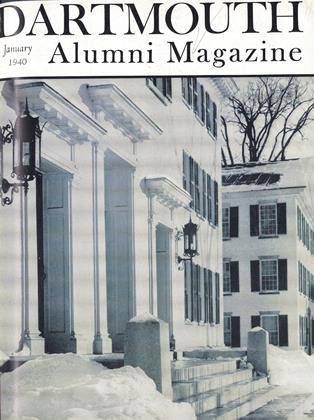IF YOU EVER did any hunting or fishing around Hanover you knew Buster Brown. He died of coronary thrombosis December 7. At 46 he had packed as much action and outdoors into his life as three Maine guides put together. Buster was born too late, maybe 50 or 100 years, but anyway too late. He should have pioneered a new country where he could have built his home and helped with others, with his own strong hands; when the man's man that he was, would have been given the leadership that he deserved. He always had a way with dogs, with children, and women, but most of all with men. Venison, partridge, woodcock, trout were the family diet, even in these days of diminished game. Town politics, rigid rules and regulations, never fitted Buster Brown. He was happy in the woods, on a stream. Hanover misses him.
ND ANOTHER FIGURE of the community is missed. Leonard B. McWhood has met many alumni in his elementary music classes. He has always been keenly interested in sports and frequently attended practice sessions of the teams. He played a vigorous game of golf and commanded respect for his game in the low 80's. Faculty meetings were often enlivened by his remarks on debated subjects. He was an ardent Rotarian and wrote a widely used song for Rotary International. Mac has gone, and with him went a vigorously active, a kindly, and in late years, a lonely man.
THE TAIL END of November was enlivened locally by a vociferous campaign by The Dartmouth to convince the faculty-student Speakers Committee, and later the Council on Student Organizations (C.0.5.0.), that Earl Browder should be presented as a speaker at a public lecture in the College. Earlier in the fall a total of three people had indicated their interest, through a poll of possible lecturers, in hearing Comrade Browder. When he had been refused a place on the Harvard lecture schedule, and had been indicted in Federal Court for perjury in connection with passport applications, a move to secure his appearance in Hanover mushroomed overnight to the proportions of vigorous promotion by a pressure group in the student body.
It was unfortunate that the red herring of free speech was thrust into the debate, but this in the end did not becloud the issue. It was a question of whether a dozen students wanted to exploit the situation because Browder had become an intercollegiate football, kicked notoriously from one eastern campus to another; or whether there existed any genuine interest in hearing at this time and from those lips the theories of his political system. This handful of students, whether for sake of notoriety or with deluded sincerity, raised a spurious issue and demanded a "yes" or "no" ruling, either of which would have right and wrong in it. A clear issue of free speech is one thing, but this specious issue had the makings of a disservice to the cause of liberalism and free speech, and also to the College.
Palaeopitus turned down a request to approve the Browder petition and gave the briefest, and among the best, reasons of the many words written on the question, saying: (1) Dartmouth's liberal ideals donot need to be defended; (2) There wasno desirability in directing an unnecessary insult at Harvard.
The Speakers Committee (a representative group of faculty and students) turned down the idea. The Dartmouth then pressed the matter to an embarrassing degree by inviting Browder and asking approval afterward of the C.0.5.0., which denied its petition in a thoughtful statement. The Council then did all that could have been expected in "putting itself on record as being willing to support his (Browder's) appearance when he can come in more dignified circumstances."
Freedom of action is vital to the spirit of the liberal college. God forbid the time will come when any individuals or groups within the College are not able to present petitions for fair and full consideration, and themselves be satisfied that good judgment prevails in the final decisions.
We sympathize with the reactions of men devotedly fond of Dartmouth who learn that the College "has refused a platform" to so-and-so. That is the disservice done Dartmouth in this instance, demanding a ruling which superficially may appear to be a repudiation of a long-established tradition that a Dartmouth platform has never been denied to a properly accredited representative of any political or religious convictions.
We have faith in the undergraduate body and in the officers and faculty and alumni. These groups are intangibly combined into a powerful, intelligent force in the democratic processes of the country. It has taken courage and far-sighted leadership for this force to earn recognition as truly liberal and of broad scope in thought and action. Equal courage and intelligence has been demonstrated in the decision on Browder at Dartmouth, and is constantly required in guiding this priceless freedom through the shifting sands of world events, making sure on the one hand that the hard-earned liberalism survives, but on the other hand that so sacred a thing is not distorted and abused.
 View Full Issue
View Full Issue
More From This Issue
-
 Article
ArticleOld Grad Looks At Siwash
January 1940 By FRANCIS M. QUA '11 -
 Sports
SportsBig Green Teams
January 1940 -
 Article
ArticleExacting Requirements in Science
January 1940 By ERIC P. KELLY '06 -
 Article
ArticleThe College In The Sixties
January 1940 By DR. WILLIAM LELAND HOLT -
 Article
ArticleCameos of a Crisis
January 1940 By ALAN L. STROUT '18 -
 Class Notes
Class Notes1915*
January 1940 By CHARLES R. TAPLIN








